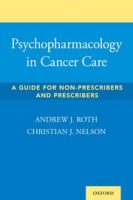 The Library has added a new eBook, Psychopharmacology in Cancer Care: A Guide for Non-Prescribers. This is an MSK authored book, from Dr. Chris Nelson and Dr. Andrew J. Roth.
The Library has added a new eBook, Psychopharmacology in Cancer Care: A Guide for Non-Prescribers. This is an MSK authored book, from Dr. Chris Nelson and Dr. Andrew J. Roth.
Psychopharmacology in Cancer Care “discusses the identification of psychiatric disorders and psychotropic treatment in cancer patients for non-prescribing clinicians, and focuses on communication skills that help non-prescribers and prescribers alike discuss the overlap of physical and emotional situations in people with cancer more clearly.”
This text also includes case reports that “highlight everyday situations in cancer settings and demonstrate how medication management changes as a patient’s situation unfolds.”
 The Library has added a new title to our collection, entitled
The Library has added a new title to our collection, entitled